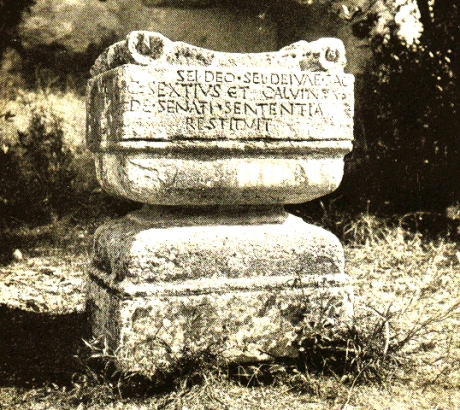
 o the Unknown God
o the Unknown God|
"The eye sees only what the mind is prepared to comprehend." - Robertson Davies "My people are destroyed for lack of knowledge." - Hosea 4:6 "The things of God are of deep import, and time and experience and careful and ponderous and solemn thoughts can only find them out. Thy mind, O Man, if thou wilt lead a soul unto salvation, must stretch as high as the utmost Heavens, and search into and contemplate the lowest considerations of the darkest abyss, and expand upon the broad considerations of eternal expanse; he must commune with God. How much more dignified and noble are the thoughts of God than the vain imaginations of the human heart! None but fools will trifle with the souls of men." - Joseph Smith "The deepest form of thought is writing." - Jordan Peterson Christ never once hid. That just wasn't his style. And yet, he did. Sort of. He switched from teaching in plainness to teaching in parables precisely to, as he himself stated, hide the real meaning from the audience. But he did so in full view of the public. He repeatedly evaded the Sanhedrin's henchmen, and their Roman proxies, but while in plain view of everyone. And yet, Nicodemus certainly knew where to find him, and even approached him, albeit under the cloak of night, so that no one else would see him, or know what he was up to. (And one really must ask one's self why a representative of the Sanhedrin needed such secrecy.) And this can only mean that everyone else in the area must also have known that Christ was there where Nicodemus was lurking. So it was no secret. It was just knowledge that didn't do anyone any good unless Christ wanted it to. Once, surrounded by a mob bent on at least beating him, if not murdering him outright, and before his time, Christ walked straight through their midsts utterly unmolested. Why? How? Surely they saw him. But, just as surely, as would happen repeatedly AFTER his resurrection, those looking straight at him simply failed to recognize him, to comprehend him. Even as he admitted his identity to his would-be captors in the garden (or grove) (the symbolism is important) of Gethsemane, the executors of the warrant became unable to carry out those orders. Stammering, stumbling, they actually appear to have been completely confused, bewildered, at a loss not only of words, but of deeds. Christ was effectively hidden from them, too, probably by that legion of angels, who, while forbidden from acting, will certainly have exuded such angelic indignation at this outrage that it overwhelmed the senses of the soldiers. Is this how the repentant escape hell? It cannot even see any but its own? Just as the wicked cannot see Christ? Similarly, the Christian apostle, Paul, bestowed upon us a stunning inheritance of information about Christ, heaven, God, AND LANGUAGE. Not that the other apostles were any less diligent in their testimonies, but, somehow, it's Paul's which have managed to reach us, through the grist-mill of time, in greater volume and force than most. Perhaps this is because his were better, or, perhaps, having been sent as epistles, they escaped more of the destructive rage of enemies, or perhaps it's simply because he was one of the last. Either way, his testimony is, to us, a revelation, and not from any rube, novice, or pretender, but from an educated, disciplined, well-traveled, international man, gifted in rhetoric, expert in law, a master of philosophy, and a personal witness to the Savior. Paul converting to Christianity in his time would have been comparable to Churchill converting to Islam, or Ronald Reagan to Buddhism, in our own. And, while those men were Christian, Paul was not only Jewish, but a Pharisee, the very strictest sect of Judaism, as he tells us himself, meaning that his was a far less likely conversion than any other. And yet, he converted to Jesus Christ, bringing all of his immense talents to bear in his drive to repent of his sins, and win the same grace which Peter, too, was so desperate to obtain. And his letters haunt us still with their splendidly argued points, favorably comparable to a constitutional scholar arguing a case in our own nation's Supreme Court, or a philosopher of the highest order debating first principles with Aristotle and Plato. They are a gift of immense worth, but whose full value has apparently not been widely appreciated since at least the fall of Masada, and, given some of his arguments, likely even longer than that, culminating, I here contend, in his words to the Athenians upon their hill of judgment, the Areopagus, or, as it's more commonly known, Mars' Hill.  And, while I do not disagree with those who contend that, in order to properly understand Greek and Hebrew scripture, one must be well-educated in those languages, I do believe that there is still much to be gleaned from them, as they now stand, than has been done so far, and that, moreover, learning those ancient tongues has a far greater likelihood of miring one in a completely different bog, never affording one the opportunity to rise to a higher perspective. Better to build on the works of others who've gone on before, comparing them, deciding which has done the better job, and using the best scholars' works. In short, I subscribe to a vacuum-cleaner approach to intelligence gathering. One can't find a needle in a haystack without the haystack. So get the haystack first, which is to say, fill your head with as much, well-chosen material as possible. That's when patterns begin to emerge. But we, today, read Paul's words, usually in short bursts, bereft of context, quantity, and quality by their brevity and infrequency, robbing us of that which is written in black-and-white, right under our noses. And not just us. The meaning escapes even the most educated theologists and scientists among us. (Scientists?! Oh, yes. You'll see.) The Christ which Paul suffered loneliness, privation, ship-wreck, snake-bite, stoning, and even death to reveal to us, the Corinthians, Hebrews, Romans, and more, has, once again, become lost to humanity, just as he was once lost in the very midst of a horde of attackers, and that simply because the words of Paul have also been lost... in plain sight. And they have been lost to an entire generation of erstwhile faithful because those who ought to have comprehended them failed to do so, and, in so failing, also failed their fellow man. It is my obligation to amend this lapse if I, too, am to have any hope of winning Christ's grace. (And I mean that more than you know, for I sympthize with Paul and Peter.) And just what can I add? Well, where most might expect recent advances in anthropology, archaeology, linguistics, or even theology to have bolstered Paul's testimony beyond that which medieval scholars have already added, it turns out that the seemingly unrelated fields of astro-physics and Quantum Mechanics have also prompted a re-examination of Paul's apologia, and that in ways which past commentators could scarcely have dreamt, not that this in any way absolves them. (Witness the words of Enoch!) Worse, because this enlightenment has been so long in arriving, modern readers have grown either disinterested or too firmly entrenched in more traditional interpretations to be able to stretch their minds to the dimensions to which Paul was challenging them. And not just Paul, but Peter, John, and the master himself challenged us to expand our thinking, and to lay hold of the inspiration of the Holy Ghost (aka intuition) when our efforts are exhausted, presenting yet another point of failure by too many. But Paul is no longer with us, can no longer dictate another of his masterful works to us to further enlighten us. Peter and the rest have left us to puzzle over their testimonies, extracting whatever knowledge can be gleaned so long after the fact, sifting through the evidence, ever refining our comprehension of their languages, customs, and beliefs. Thus, it falls to me to bridge the linguistic and cultural chasm separating their time and place from our own, not to rehabilitate Paul, Jesus, or Christianity, but to explain to fellow wise men, seekers of truth, watchers of the heavens, those who "hunger and thirst after righteousness", exactly where the intervening defenders of the faith, and detractors alike, however ardent, however lettered, not only went wrong, completely missing the point altogether, but, to their eternal detriment, led others astray, as well. Yes, even detractors. For criticism, too, must be not only constructive, but guileless, or it is deceit. Thus all err, as you will see. Almost everything that you, too, believe of Paul, Christ, Christianity, religion itself, is almost certainly wrong. Even this. So, if you've never really known much about Paul, or Jesus either, for that matter, then this is for you. If you've ever had your doubts about Paul and Jesus, then this is for you. If you've suspected that something in your understanding about anything related to Christianity and its history is not quite right, and you want to know more, then this is especially for you. If you just don't really have much regard for religion, this should be of particular interest to you. If, however, you are one of those strident arbiters of your own interpretations of truth, ... You know, the good old-fashioned Bible-thumpers, ... then you almost certainly need this even more than the rest, but will not likely be impressed by any of it. More likely you will be provoked into lashing out, attempting to shout me down, kicking against the pricks, as Paul said. Just know that I'm not here to learn from you. Odds are that you have little to nothing to teach me, and the evidence weighs heavily on my side, so your views will not be welcome here unless you can present them in the most polite of ways, in which case you'll find me very receptive, polite, even thoughtful in my responses. And, if that's what you wish, I am absolutely willing to engage you. Under the previously stated conditions. May God grant me success in conveying this message to your hearts and minds. May you all be humbly receptive of this, my final act of love for you. This is what I can add. Christ doesn't hide. If we can't see him, it's because we're looking for the wrong man. |